Spring 2024
SOCI 2300
Raka Sen
Thursday, 3:30PM-5:00PM
Environmental Sociology
This seminar will explore how sociologists and adjacent social scientists have investigated the intersections of the environment with inequalities of wealth and power, with a focus on a broad "climate change and society" field. The seminar will cover a) recent efforts to reframe the history of capitalism as the history of a socio-environmental system (and overlaps between that agenda and the "racial capitalism" framework); b) the genesis of US-based environmental justice scholarship; c) the global sociology of carbon emissions and international environmental movements; and, d) new trends in "climate change and society" studies.
Course Objectives
- Identify core concepts, theories, and perspectives in the study of environmental sociology.
- Examine emerging approaches and questions that characterize contemporary environmental sociology.
- Critically analyze the reciprocal relationship between human society and the natural environment. Seeing how the environment plays into other aspects of social stratification put forth by sociology.
- Generate new theoretical and analytical questions related to the causal mechanisms underlying environmental degradation and improvement.
- Identify new research questions related to the study of the environment and propose ways to study those questions.
- Understand changes in the natural environment through a sociological perspective.
- Understand how global trade relationships impacts environmental harms in developed and less developed countries.
- Explore the origins and impacts of environmental movements seeking environmental justice.
- Think critically about the climate changed present and future.
Spring 2024
BEPP/OIDD 2630
Arthur van Benthem
Tuesday/Thursday 12:00 PM - 1:30 PM
Environmental & Energy Economics and Policy examines environmental and energy markets from an economist’s perspective, ranging from fossil fuels to renewable energy to carbon-trading systems, and explains how different regulations can provide efficient or counter-productive incentives for firms, consumers and politicians.
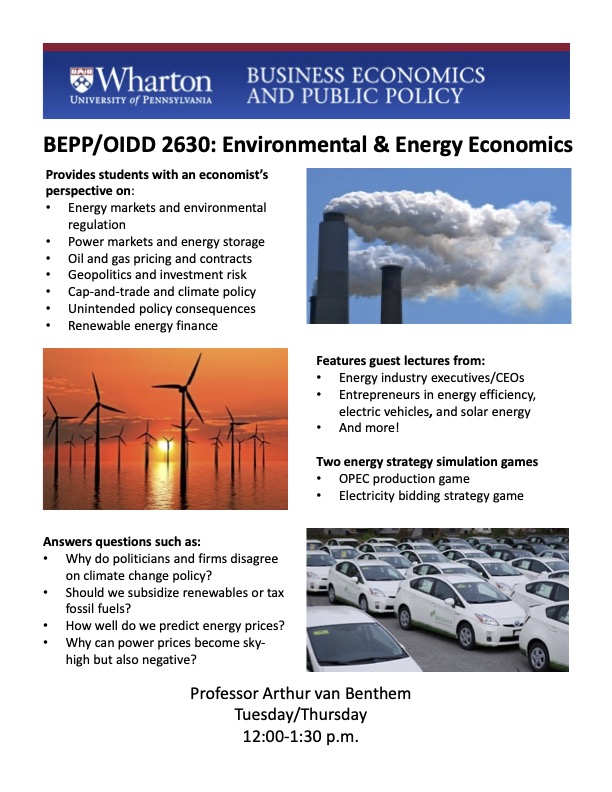
Spring 2024
ACCT/BEPP 7640
Arthur van Benthem
Tuesday/Thursday 10:15 AM-11:45 AM and 1:45 PM-3:15 PM
Climate and Financial Markets examines how climate risks (physical and regulatory) and opportunities affect financial markets, markets for real estate, insurance, energy and carbon, and the firms and investors that are active in them.
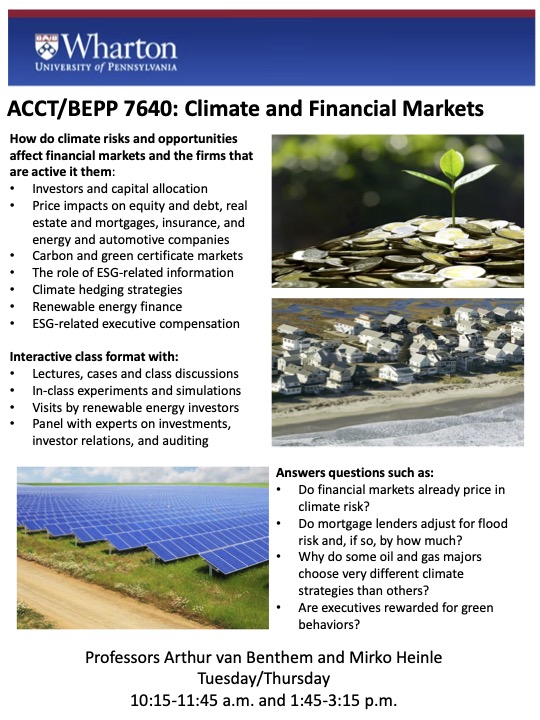
Spring 2024
ENGL 3423.301
Peter Tarr
Tuesday 1:45 PM-4:45 PM
This course is for students who care about “the fate of the earth,” and who want to try their hand at formulating relevant publication-quality fact and opinion pieces.
Those students include:
STEM students who are writing-curious
Journalism students interested in sci-tech writing
Prose writers who care about using facts to tell urgently important stories.
We'll tackle urgent topics that regularly command today's headlines, such as: global warming (should we risk geoengineering the climate?); “the 6th Extinction" (should we try to save every endangered species?); and preventing the next pandemic (should researchers be allowed to augment non-virulent viruses to learn how to defeat them should they mutate?).
Inaction on issues that threaten life in the world your generation is now inheriting may be due, partly, to the difficulty of formulating coherent opinions about corrective courses of action. One way to avoid the “deer-in-headlights” non-response is to learn enough facts to formulate compelling, persuasive opinions. This course gives you the chance to do precisely that—while improving your writing skills. You will also work on a semester-long reporting project of profiling a scientist, doctor, or researcher who is involved in sci/tech/fate-of-the-earth issues.
This course is cross-listed with Science, Technology, and Society. For students in the Penn Program in Environmental Humanities, this course meets the Humanities and Public Engagement requirements.
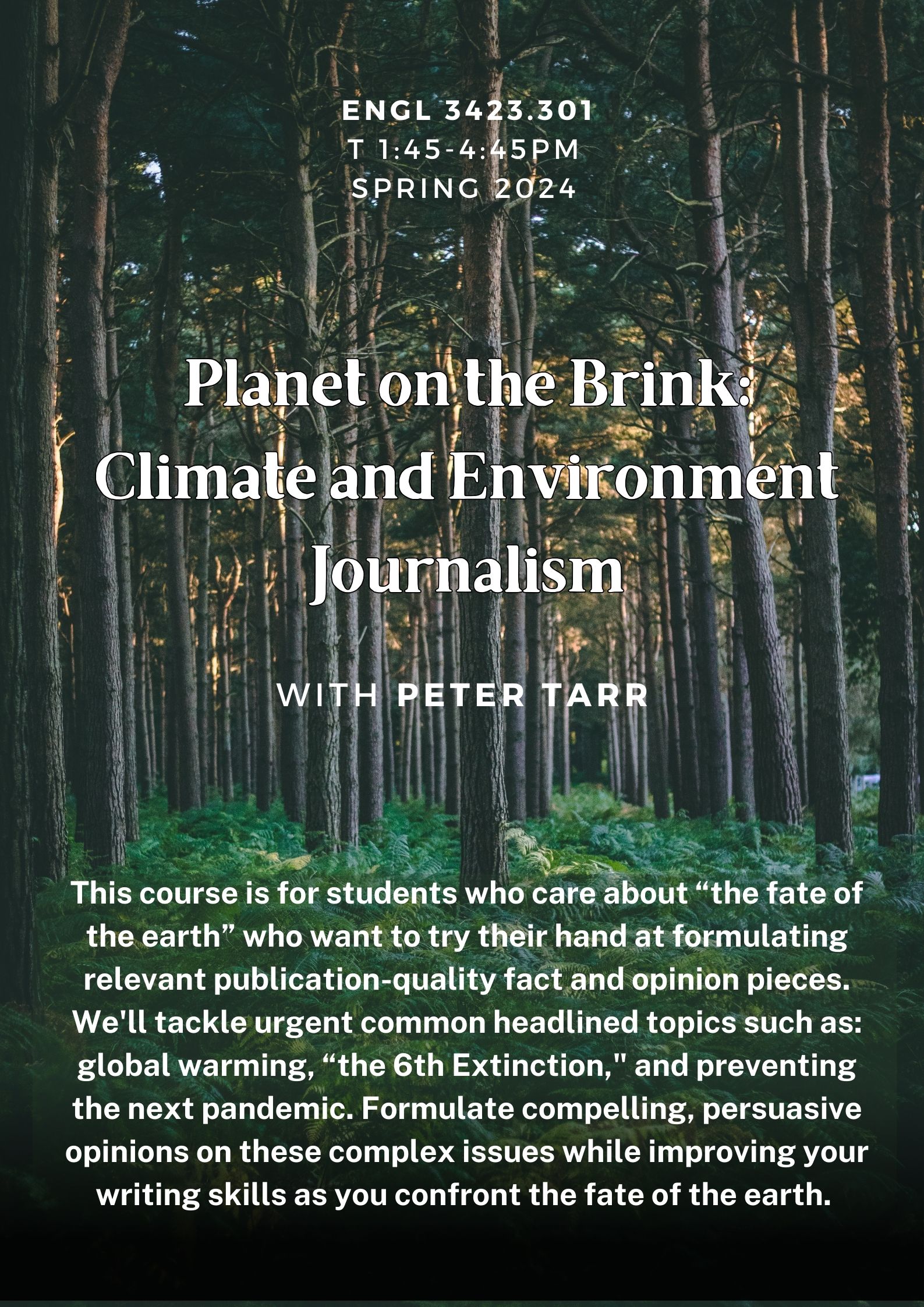
Spring 2024
PHIL 1343
Paul Musso
Thursday, 10:15AM-11:44AM
We investigate some of the ethical issues that arise from our relationship with the environment.
Topics may include : What are our responsibilities toward the environment, as individuals and as members of institutions? How do our responsibilities toward the environment relate to other ethical considerations? Do non-human animals/species/ecosystems have intrinsic value? What should conservationists conserve? What is the appropriate response to climate change?
1 Course Unit
Spring 2024
PHIL 1571
Carlos Santana
Thursday, 10:15AM-11:44AM
This course is a comprehensive introduction to the climate emergency and the tools with which we can fight it. It will integrate natural science, social science, philosophy of science, history, ethics, and policy.
The course opens with an overview of the historical discovery of global warming and our contemporary understanding of climate change. We then turn to the framework that the United Nations' Intergovernmental Panel on Climate Change has developed to study climate risks, focusing on both general issues and case studies throughout the world. The existence and severity of these risks raises questions of climate justice at many levels: individuals to individuals, countries to countries, and the present generation to future generations. We will study these issues in detail, and then examine the policy tools developed to address them. Although we will discuss national and sub-national policy and policy proposals such as the Green New Deal, special attention will be given to global policy tools, especially the Framework Convention on Climate Change and the Paris Agreement. In addition to standard writing assignments, students will have a chance to develop policy proposals that address the core issues of the class.
Also Offered As: ENVS 1043
1 Course Unit
Spring 2024
ANTH 543, COML 562, ENVS 544, GRMN 544, URBS 544
Bethany Wiggin
Wednesday, TBA
By necessity, work in environmental humanities spans academic disciplines. By design, it can also address and engage publics beyond traditional academic settings. This seminar explores best practices in public environmental humanities. Students receive close mentoring and build collaborative community to develop and execute cross-disciplinary, public engagement projects on the environment. This spring, this broadly interdisciplinary course is designed in conjunction with the ongoing environmental humanities project, An Ecotopian Toolkit for the Anthropocene. In the framework of our seminar, students will have opportunities to work with tne project’s curators and educators as well as Toolmakers on project-based assignments that also engage wider publics around issues of climate and environmental justice. This lab-style seminar is suitable for advanced undergraduates (with permission) and fulfills the “Capstone” requirement for the Minor in Environmental Humanities. It is also open to graduate students in departments across Arts and Sciences as well as other schools at the university.
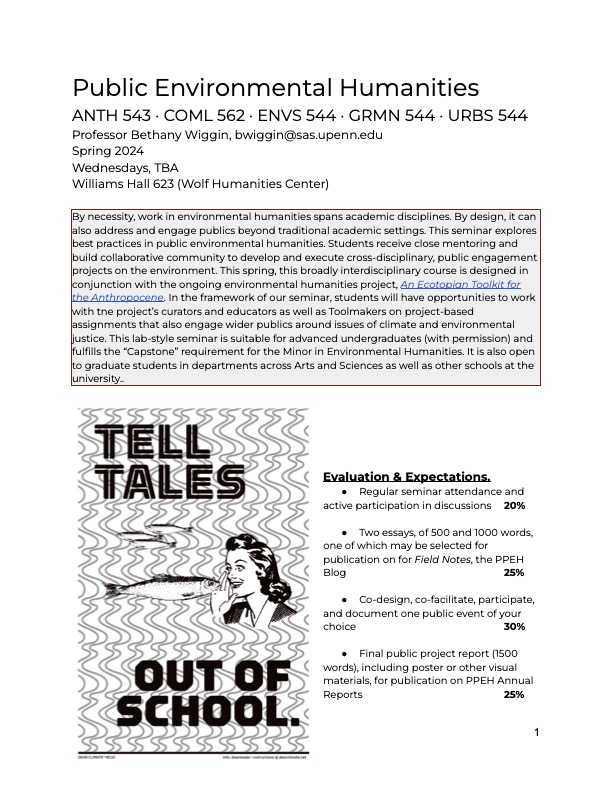
Spring 2024
DSGN3250-401
Kaitlin Pomerantz
Tuesday, 1:45PM-4:45PM
How does matter transform into material, and back again? What hidden labor, sites, social and ecological costs and processes go into the production of a “blank” canvas and other “raw” materials? And why-- for artists, designers, architects, preservationists, creative educators, builders, and anyone working with materials-- do these realities matter? This course connects arts and design learners to considerations, sites, and cycles around production and disposal of the defining materials of their creative fields (ex. paper, wood, glass, pigment, "the internet"), laying groundwork for creative practice rooted in social and ecological awareness, repair and care. A hybrid research seminar, field exploration, and studio investigation, the structure of this course alternates between reading/response/research, field trips and guest visitors (including a partnership affiliation with RAIR Philly), and time for responsive “making” and material experimentation/synthesis. In this course, students will collaboratively define key terms and concerns around material sustainability, discard studies, land and labor relations vis-a-vis creative work. Students will experience local sites of material extraction, production and disposal (through approx 5 field trips taking place during class time). Students will formulate individual or group questions around a specific material, leading to a final independent project, and class exhibition. This course will engage students in forming a material ethics to guide future creative work.
Spring 2024
ANTH 2970
Nikhil Anand
Friday 10:30AM-1:14PM
In this course, we examine the pernicious yet changing relationships between people, infrastructures and the environment that have produced the climate crisis. Drawing together classic texts and some of the newest debates in the field of Environmental Anthropology, we focus on the social processes through which different groups of persons imagine and produce both the catastrophes of the climate crisis, as well as projects to address its most durable effects.
The course will begin by reviewing the ways in which the environment is 'cultured'; the ways in which it is imagined and inhabited by diverse peoples around the world. In the second part of the course, we turn to political ecology, exploring how the durable histories with which racial capitalism and coloniality have rendered environments precarious. Here, we also focus on how the environment becomes the terrain for environmental justice struggles by black, brown and indigenous communities. In the third and final section of the course, we will move past disciplinary renderings of nature and culture to examine how lives are being lived otherwise in the vital ecologies of the Anthropocene.
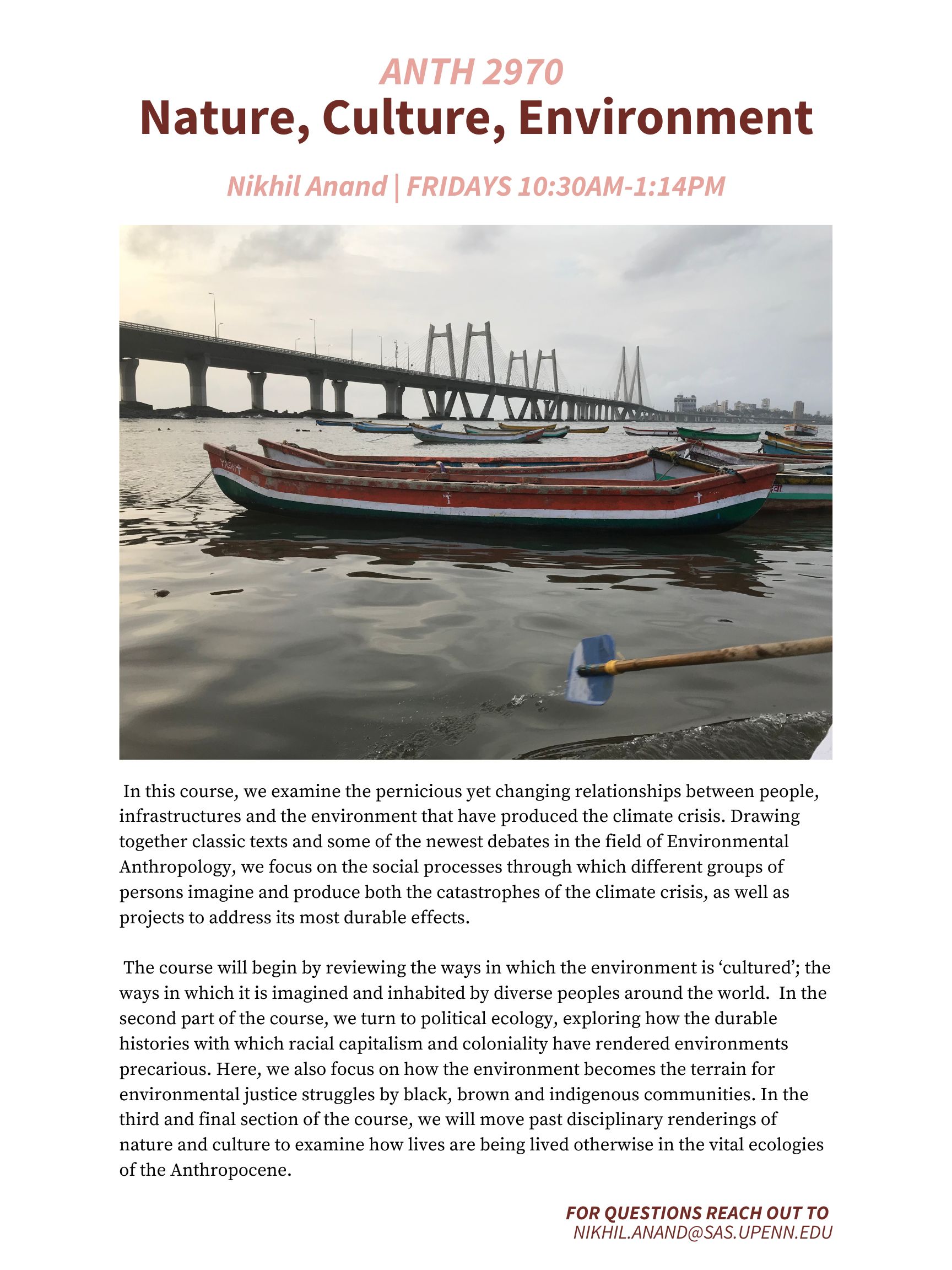
Spring 2024
STSC 0668
John Kanbayashi
Tuesday, 12PM-2:59PM
Rivers provide and divide, they constrict and connect. Although a fundamental source of prosperity and transit for human societies, they resist even the most sophisticated attempts at human control. This class examines rivers as movers of history—as sites of contestation and transformation around the globe—with a focus on how diverse societies have understood and used them. Topics include: irrigation and political power, flooding and course changes, scientific measurement of river systems, the twentieth-century rise of the concrete dam, subsequent movements towards undamming, and recent efforts to grapple with climate change. For first-year students only.
